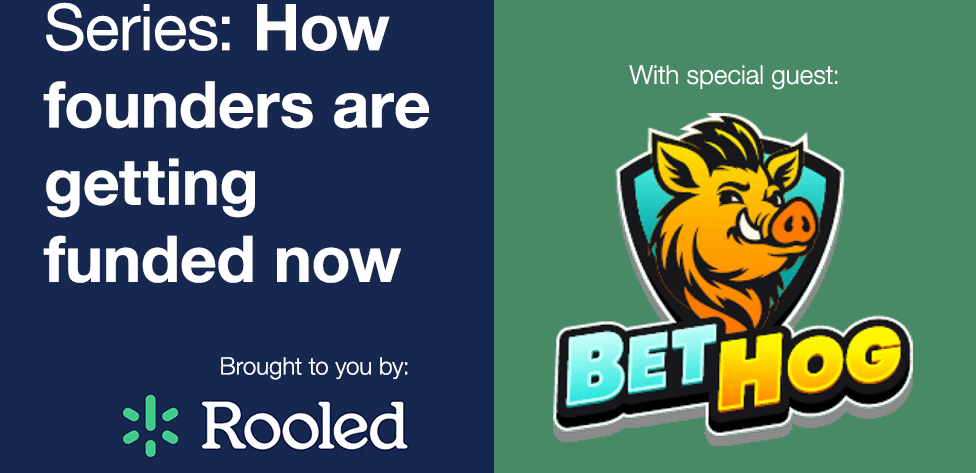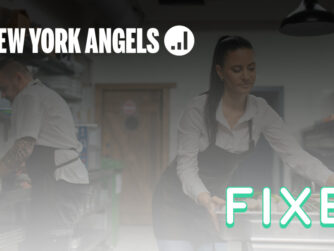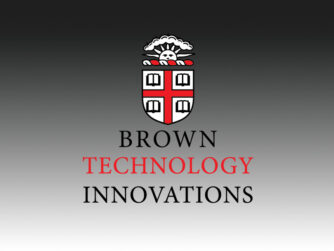Industry: Online Sports Betting; Outsourced Accounting and CFO services
Location: Belize City, Belize and New York, NY
Read the Transcript
This transcript was AI-generated. Please excuse any typos.
David: Welcome back to the Angel Nest, where real angel investors and entrepreneurs partner to build great companies. I’m David Hemenway. I’m a five-time founder and now an active angel investor. And this is another of our series of podcasts with Johnnie Walker of ruled, outsourced CFO and accounting services. We’re talking about great startup founders and the companies they’re building ruled are the startup finance experts today, Johnny and I talk with Nigel Eccles, a founder of FanDuel and a board member to startup companies all over the world. He’s raised more than half a billion dollars in VC funding, and now he started BetHog, which combines sports betting with cryptocurrencies. Johnnie and Nigel, thanks for joining us today. It’s great to have you.
Nigel, as a founder of FanDuel, you are an early believer in sports wagering, and I’m curious if the industry has grown up as you expected.
Nigel: Oh, give me a big question for the opener, so you’ve got to sort of like, let’s go back. We started FanDuel in 2009. At the time, sports agent legal in the UK and a lot of other countries around the world. The only place was legal in the US, essentially, was Nevada, Las Vegas. It was explicitly illegal for the other states to even to legalize. They couldn’t even provide it. They couldn’t legalize it. And so it was a very small market. The casinos, even in Nevada, the casinos, it was a loss leader. They just didn’t really care about it. What they wanted is they had it there because they wanted people to come in and then go play slots or go and play table games. And so they didn’t really care about it. So people didn’t really think it was like a really big market.
Now, at the same time, lots of people are betting offshore, huge offshore, huge black market offshore. Well, that was part of the incentive, right? Yeah. So, like it was, it was, you know, there was this huge offshore market, you know. And people were, like, they were betting with bookies in Curacao and Costa Rica. That was illegal. It was very clearly illegal, but there was a lot of demand. And so in 2009 we launched FanDuel. We were like, well, you know, we can do sports betting. I worked in the sports betting industry in the UK, but we can do fantasy sports. And so we looked at fantasy sports, and we’re like, Well, okay, you know, a game that takes like, six months to play, and the prize is $100 plus some, like, dinky trophy. Like, it’s cool, like, people love it, but, like, how do we make it more exciting?
And so a few things that we sort of thought we had three big ideas. The first one was, six months play one day. You know, let’s draft a team. You play in one day and you win in that one day. Number two is, let’s have bigger prizes. Like, let’s have real prize funds. And you know, some of our biggest tournaments, in the end, were in the millions of dollars, right? That was the second idea. And then the third idea was, at the time, everyone was doing this on their laptops, and it wasn’t mobile. This is 2009 iPhone just launched, and we were like, well, this should be an experience on your phone. So that was the other big idea. And all three of those big ideas, basically, was, what kind of was the starting point of what happened to DFS, which became a, you know, very big business, but then sports betting on top, which has become an enormous business.
David: Did you ever dream would be as big as it’s become?
Nigel: Yeah, I certainly, you know, I always looked and I thought, US is such an anomaly, right? It’s such an anomaly when, when you do, you look at it, and you go, okay, per capita, if the US had legal sports betting, that would be really big, if you just sort of compared it to, say, the UK, but then you look at it and you go, but the US has got a lot more sports in the UK. Like us is UK is very heavy for premiership soccer, but us is, you’ve got like four major sports, but they also follow soccer, and they also follow tennis, and they also follow golf. And so we were like, okay, per capita, it’s going to be bigger. And you know, and also just sports, which is so much more prevalent. You go into a nice restaurant in New York, you’ll have sports and TV. You’ll not see that in London. So we were like, if it happens in the US, it’s going to be an enormous market.
And so, yeah, I think we did think, what we didn’t know was, how does it happen, right? Because we had a federal law that said, Hey, you New Jersey. Or any other state, you can’t have sports betting. So what we didn’t see was how that was gonna change. No one really knew that. But that was kind of the we knew if that did change, yeah, it was gonna be enormous. Yeah. And how did that change? Oh, yeah. So what happened was, it was actually New Jersey looked at it, and New Jersey has casino business that’s been really challenged for many years. And they were like, we should be able to do sports betting. And they tried to do it. They got sued repeatedly by the leagues to say, No, there’s this law called paspa which prevented states from doing it. And they fought it, and they took it all the way to the Supreme Court, and in 2018 it was heard, and it was ruled that possible was unconstitutional, because if you think about it, there’s no other law, certainly I could think of, that says, hey, you Nevada, you can do all this good stuff. Jersey, no, you can’t. You cannot do this. And so the Supreme Court said, this is all. Unconstitutional. So in a stroke, like in a pen stroke, suddenly all the states can go, you can legalize it. And Nevada, I think, was second. I think Delaware, you know, there was, there was a rush, 2720 18, for all these states to get legal and then adjust. And since then, I think we now have something like 40 states have legalized. Yeah, really incredible Snowball from that, you know, first starting shot, which was 2018.
David: Did the investors that you had up to that point where this kind of the flood gates open, did they? Did they perceive, like, the risk of fangil succeeding to be this regulatory risk? Was that really clear?
Nigel: Yeah, you know, it was like, you know, I we had some brilliant investors. And I’d say we had some, let’s say, less visionary investors. And I’ll say, you know, the brilliant investors were the ones who weren’t. They weren’t going to say that a crystal ball, but they’re like, look, this is, we love this asymmetric bet, right? And they were that asymmetric bet was like, Look, at minimum daily fantasy sports, a great business, and it is a great business, but if sports betting would happen, we’d be brilliantly positioned.
We had some other investors, laughably, were like, Oh, I’m really worried about sports betting. If that happens, you know, Caesars and MGM is going to crush us. And you remember, I remember going, like, you’ve been on this board for years. Like, do you not understand? Like, we have 500 people in the room in this company here whose job is, you know, online marketing is building product is, you know, marketing to and we have built a sports orientated brand. We have a million registered users that soon as it goes live, we’re like, boom, cross sell, right, go over to Caesars, right? Like, I have a lot of respect for them, but they don’t have that, like, they don’t even know, they don’t have a brand. They don’t really know how to market online. And so, you know, when they came out of the gate, they were like, then the first thing they did is, he went and bought William Hill, which is a UK bookmaker, because they’re like, We don’t undo this, right? MGM partnered with a UK company called Antin. And even then, and that was, you know, and very well run bet MGM is a very well run company. Even then, they’re a pretty distant third. The companies that dominate the market are fandom Draft Kings, which are daily fantasy sports.
They were disruptors startups. But, you know, it’s funny, because it wasn’t just one of my investors, like a lot of commentators, were like, just wait until, you know, the signs or wind gets into this, they’re going to dominate. And I just think that repeatedly, people make this incumbency error. When with startups, they’re like, you know, even us like, for us, we were like, Well, what about when Yahoo, a lot of investors have win? What about when Yahoo comes in? I know today that sounds laughable, but back in 2009 2000 10,011, Yahoo was a really big media property, and Yahoo did come in, and they were a disastrous like, they were like, they were like, you know, fractions of a point 1% market share. The product was a clone of ours. They didn’t really know what they were doing. And so, and I seen that repeatedly in startups, you get a startup if people are 100% focused on this one opportunity, you know, when you’re up against big incumbents, you typically win, you know? And that’s kind of like, so, yeah. So we Yeah, not, not all of them were visionary. Some of them were fantastic. They absolutely were like, this is, this is, you know, there’s a great opportunity.
David: Do you think that coalescence of skill and then sort of focus on, on an opportunity, does that? Does that tend to happen at a particular point in a company scale? Like, even, to put it very simplistically, like, is it at 100 people or 50 people? You kind of tend to have that scale of business where there’s enough understanding about what a focus on and you coalesce around it?
Nigel: Yeah, I think, like, my impression, is very early stage startup say, pre product market fit, you definitely have to be pretty scrappy. And like, I find a lot of entrepreneurs will do revisionist history on like, their journey, and they’ll forget about the scrappiness early on, where maybe you’re not as focused, because pre that, I think focus is a bad thing. You should be like, Okay, maybe there’s a better opportunity here or there, but once you have that opportunity, then you need to really focus. You really need to go, Okay, are we going to absolutely nail this? And that’s from five, you know, a five person team, to a 500 person team that you’re you’re still narrowly focused, and, you know, it’s interesting, and I’ve seen this with some founders pitching me, and they’ll say, Well, what’s the revenue stream? And they’ll have five revenue streams. And I’m like, Oh, that’s a bad sign. And the reason it’s a bad sign is it sort of suggests they haven’t really thought about what is the key thing. They think it’s kind of add a dev well, we’ll have this, and we’ll have this, and there’s that with almost without exception. I think LinkedIn is one of the few exceptions. They grow from one massive revenue stream, and they look at Google like, that’s obviously a massive revenue stream, but nearly every startup is like, there’s one thing that they’re going to do and they’re going to do incredibly well. And if that’s a big opportunity, then that’s a very real this stuff will come and the little stuff is a distraction, right?
Yeah, the stuff on the sides the, you know, I even, like, I’m guilty of as well, like, I threw up an idea that I’ve been working on our C team just earlier this week, and they were like, doesn’t feel really core. And I’m like, Yeah, but it’s really cool. And we could do this, and we could get these people on board, and they’re like, doesn’t really feel I think what they were telling to me was, like, focus, focus. And, you know, so I like, talk to them, like, okay, but I need to convince them. And I talked to a few more people about this, and I was like, I’m making that mistake again. You know, because you’re always like, I think, as a founder, you I always feel a lot of founders want to disrupt, and that does, that includes their own startup. But, you know, like, they’re like, Okay, that’s going, well, it’s growing, but I want to do something like really crazy, you know, and bring that in. And so the job of a good founding team is like, yes, let’s have those crazy ideas, but then have the filter and go, maybe we should just focus on improving what we have and keep doing that.
So investors are guilty of letting their emotions override their judgment, right? Because we all know that while the idea, the brilliant breakthrough idea, is the fun part, yeah, the stuff that’s really profitable is grinding out. I think we’re all guilty of this. It’s really hard. Like, you know, like, when you say, like, if we get, you know, two, 3% better every day this year, that is a phenomenal business. But doing you know, buying your head against the wall two to three get that 2% gain every day is really hard. It’s really miserable in a way, like, some days it’s like, and some days, and it’s not linear, like, you’re some days it’s actually down 10% right? You know? And you just have to, like, Okay, how do I improve this conversion from just a little bit. Do that every day, day in, day out, right? And if you’ve got it, if you’re actually going after a real opportunity, that’s going to be an enormous business. But it’s really hard to do that. It’s easy to say, it’s hard to consistently do it day in, day out.
Johnnie: I remember you said this when we were when we were fishing recently, that people come to you and say, I want to be an entrepreneur. And you’re like, No, you don’t. You want to be a successful entrepreneur. The implication being beyond says, Yeah, miserable…
Nigel: Yeah, terrible. He’s a terror. No one ever, ever, in the history of ever said I wanted to be an unsuccessful entrepreneur. Better off to have a job, but, yeah, much better to have a job is much better to be an honest, unsuccessful employee, because you get paid every month and and if you’re at least not in the bottom, like, you know, 10 or 20% you’re probably just going to just gonna stay there and it’s gonna be fine, and, you know, but, yeah, now being, you know, being in the, being in the bottom 50% of outcomes, or even 80% of outcomes, for entrepreneurs, is typically not grit, right? What everyone sees is the top well, sometimes they just see the top 1% and they go, that looks amazing. Yeah, that is, but, you know, that’s 1% it’s kind of like looking at, you know, professional football, and say, I’d love to be, you know, I’d love to be up there. And you’re like, Well, what about, are you willing to start down here and go through every step? And you know that that’s the experience somebody had. So that’s entrepreneurship much more variable.
David: So tell us about BetHog.
Nigel: We started BetHog last year, and really the thesis was quite simple. We see crypto as an emerging asset class, and unlike sort of previous asset classes. So crypto today is worth depending which day of the week, it is about three and a half trillion dollars. Crypto quite dominant from Bitcoin. Bitcoin is about 60% of their dominance. But the really interesting thing about crypto is it is, it’s highly liquid. So it’s unlike other like assets. I like gold. Gold is not liquid. You know, buying physical bars. Or when I was young, my mom was advised to buy Krugerrands, with these little coins, and you stack them, and you’re very difficult to sell, and they have very high transaction costs. Crypto, you hold it yourself. You self custody it. A lot of people like myself, we would self custody. And so you have complete control over it. It’s completely liquid. You get a price every day, you can sell it for, you know, fractions of percent, you know, in terms of transaction cost, I can send money anywhere in the world almost instantly, at almost no transaction costs. The people that are into crypto are typically young, male, risk seeking. Well, who loves online betting and who loves online casinos, young male risk seeking, right?
And so that, to me, was like, wow, this is such a big opportunity. Secondly, you know, FanDuel, in the early days of FanDuel, something like 15 or 20% of our revenue was getting eaten up in payment processing. So people think, Oh, I just send my money to FanDuel and it all shows up. So it’s like, free, and it’s like, well, it’s free to you, but FanDuel eats those costs. And those costs can be because what often happens is someone will deposit the wind and then draw their money, and then they’ll redeposit, and that goes again and again and again. Yeah, and so you’re talking about 15 to 20% of your of your costs. Additionally, you’re subject to fraud. So user comes in, deposits, you know, $1,000 loses it, wakes up the next day and said, You know what, I really didn’t want to lose that. Contact your credit card company, and then it’s on FanDuel to prove that that user actually deposited it. And the credit card company is like, takes the money back from us and says, you know, no, you have to prove that this user deposit. Very difficult when they’re remote. So it’s very expensive. It’s a bad product, you know, subject to fraud. With crypto, we basically give somebody a wallet address, they send that money. There’s almost no transaction costs. It’s like, so small, it’s instant. And certainly that type of fraud doesn’t exist. You know, we basically, they send us the money, it’s there, and when they want to draw it, they can withdraw it. So it’s a much, it’s a great demographic, and from a payment perspective, it’s 100 times better.
David: So you’re taking bets in crypto. So let me talk about the product.
Nigel: Yeah, yeah. So that was kind of the background why we thought about it. So, yeah, basically the idea was, with bed hog was we want to build a crypto Casino. And we had, we had sort of, and there’s a lot of crypto casinos out there. I think she’s probably something like 2000 of them. And we sort of said, okay, there’s two things we want to do. We’re going to distinguish ourselves. One was, we want to be a really fun brand. And that’s when we spent a lot of time thinking about our brand and and we had a lot of different ideas. And we came up with BetHog, because our designer, we saw the demand, and we were like, I don’t know. And then our designer came up with the logo, which was this hog. And we just all thought was hilarious. It was just very funny. We were just like, okay, you know, one of the problems, I think, with betting and even FanDuel. You know, we were building FanDuel. We were so nervous about regulatory issues that we were like, we’ve got to be really conservative, like a bank, you know, really trusted. We want people to trust us with their money, and so we’re gonna be really conservative. And so the branding, a lot of the time, was very conservative, right? It was very like, let’s not push the envelope. Let’s not go crazy. And so I’m, like, with this one, I want to go the way. I want way. I want to be fun, right? We betting is entertainment. It’s fun. It should be fun. Let’s have a brand that’s really fun. So that was the first part. Second one kind of helps. The flip of that is, of those 2000 online casinos, I think maybe two or three. If you go to their website, can you see who their founders are? In fact, actually, none of them. No one. One us. We’re the only one. If you go to the website and you go to about us, you’ll see a picture of me and my co founders and my team, right? And you think, wow, these sites are taking 10s, hundreds, in some cases, billions of dollars, in deposits, and those users don’t know who runs them. That, to me, is like, insane, right? And so I’m like, and the crazy thing to me is, like, you know, maybe some of those people who run them may think, ‘Well, I don’t want to get in trouble and stuff.’ And I’m like, ‘Well, if the US government wants to come after you, they’ll find out who you are.’ Like, it’s just not having on it. So I’m like, that’s crazy. I’m gonna put I want to stand behind this, like, I want my brand to be on it, that people know that there’s a problem. Here’s my Twitter, here’s my email address. They can email me and we’ll resolve that. I just find it amazing that people actually would deposit, you know, never mind, millions of dollars, 1000s of dollars, into a website with no you know, the company is offshore. I don’t know who’s behind. You know what? You know that, to me, was amazing. So we were like, okay, trust front and center. We’re going to say, here we are. This is who’s behind it. You know, you can contact me if there’s an issue.
So that was the second big thing in terms of the product users deposit in crypto. And we take Bitcoin, Ethereum, a lot of stable coins, usdt, USDC, and they and then bet on those. Because, you know, one of the things interesting is it’s not just that I want to fund my account with Bitcoin. If I am pro Bitcoin, I want to hold Bitcoin, right? And so I deposit in Bitcoin, leave it there. And if bitcoin goes up, my wallet goes up in value, and if it goes down, it goes down in value. So they’re betting in Bitcoin or Ethereum, usdt, and it’s both casino and sports book actually a very big part of our business. And Fast Food Charter Business, actually, casino sports book is the area that I kind of got excited about. I’m like, wow, we can build a really great sports book. People can bet with sports and we discover is, yes, that’s great. But, you know, people will often all put on bet on for tonight, but let’s go spin up some blackjack for the next couple of hours. So, and they’re both, you know, they’re both really, really good, but, you know, really good businesses.
David: And where are you now in the journey?
Nigel: So we, we raised 6 million last summer, two major investors, six man ventures, which is New York fund, and will ventures also in New York fund, six man ventures, much more in the crypto side. Will Ventures is very much more strong on the sports side. So we raised 6 million. We’ve got a team of about 15 people, my co founder, two of my co founders, my two co founders are in the UK. So we’ve built up our engineering team there, and then our product and business, or, sorry, our marketing business side is more. In the US. So we were 10 in the UK, and about five in the US. And then we’re, we’re just scaling the business now. It’s growing really rapidly. We, you know, with that 10 person engineering team, what we’ve discovered is that we can, we’re really investing early in product. We’ve seen a lot of our competitors, they just take a marketing focus. They’re like, No one cares about the product. You can just throw out a product and, you know, put all your money on influencers. And we’re like, that’s not we’re going to do we want to have the best product in the in the industry. And to get there, we’ve got to have a big team this building, and, you know, really focus on building the best product. You were talking earlier about the naysayers early on in handle and right some of the other features, I think it started with the state lotteries, when people started to say there’ll never be enough betting to compensate for all this. And yet it’s never true. Just continues to grow.
So you know, betting is a is recreational activity. It’s a funny one, and people often size a market dependent on what they and their friends do. So if you’re not someone who bets a lot and your friends don’t bet a lot, you’ll like, a classic one is Lottery. Lottery skews for, like, lower socioeconomic demographics, and so most people are like, you don’t really think about the lottery a lot. And then when they see the numbers, and they’re like, Oh my God. Like, you know millions, you know, hundreds of millions of dollars every week is bad, you know, as entered into the lottery, and they’re like, who’s doing all this? And I’m like, well, not your friends, right? But it is enormous. It’s one of the biggest betting products in the world. Is lottery. So, yeah, so a lot of naysayers, sometimes they’re like, Well, I and none of my friends do this, you know, so they come to some size of market like that. What we see is with crypto, like our user base, our crypto users, we don’t try and target anybody who doesn’t have crypto because the conversion. But you know, to use our product, you have to have crypto. You have to be able to send crypto to our wallet, and so you have to be comfortable with that. That’s only probably a small percentage of the, you know, the world, even of the people who own crypto, a lot of people who own crypto, they have it on Coinbase, just stays on Coinbase. They don’t ever take it out, because they don’t trust themselves. So we are much more targeted people that have crypto, they’re very comfortable with it. And, you know, that’s, that’s who our target users are.
David: And how big do you think that market is?
Nigel: Well, our we we estimate today globally, and it is a global market. One thing I should mention is we don’t yet operate in the US, so we only operate internationally, like nearly all of our competitors. We estimate the global market for sports, crypto sports betting, casinos, about 10 billion a year. That’s up from probably less than a billion only about three or four years ago. Big growth from COVID. And also a big driver is if tokens are up like, there’s a huge wealth effect, you know, if you bought, if you bought Solana, $10 like, you know, two years ago, and it’s now trading in $160 well, you’re a lot richer, and, you know, you want to do something with it. You’re playing with house money. So we’re more than happy to help you.
David: Is it that the US not really being a market for yet? Is that another regulatory event?
Nigel: Yeah, that’s a definite.. And it’s, the challenge is, you know, a lot of the regulators are quite conservative. A lot of people still have this view that crypto is, you know, it’s fund is terror. I’ll give you the critics. It funds terrorism. It’s there for money laundering, you know, it’s crime, it’s for tax evasion. And the funny thing is, when you go through all of these, crypto is the worst thing for that. The best thing for all of those things is typically cash, right? It’s untraceable. You know, that’s what most crime is conducted in, is cash. Why is crypto really bad? Because it’s completely traceable, right? Like, you know, if I were to send money from my wallet to your wallet, anyone in the world could see that you can just go and look, and if they know that’s my wallet, they can see every one of my transactions and where I was sending money. So, really bad for really bad for crime, really bad for money laundering, like, really bad for money laundering, because you can see where all the money went.
There are certain types of things that we see in crypto. You know, there are certain types of like ransom attacks. Is sometimes where we see this being used for crypto, but as a percentage of total fraud and financial crime, it is tiny. What crypto is really good for is for very fast money transfer across the world at very low cost. And that’s an even today. Now what we’re starting to see is the major banks actually wake up and say, well, we should have a stable coin like this is really like, you know, JP Morgan, which is for years, has hit a crypto is now gone. Well, actually, you know, having a stable coin would make sense. It’s, you know. So we definitely see it the last. Administration, the Biden administration, it was incredibly hostile to crypto for and it was kind of bizarre, because what we saw was there’s a lot of crime in crypto that seemed to go unpunished. But the operators like, you know, Coinbase, uniswap, you know, Gemini, all the kind of very legitimate try to fill in all the forms, try to follow all the law. They were ones getting sued by the government. And so the government was basically like, we are going to try and kill this industry. And so it meant that for as entrepreneurs, a lot of entrepreneurs just went offshore. They just can’t operate in the US, which is insane. So the what we’re now seeing under this government is the no, we want to work with the industry. And, you know, there’s a lot of there’s new regulation needs to be written. Like, for example, a stable coin bill. Like, suddenly the US is saying, You know what? Stable coins are really good for the US dollar, but we should have some regulation for around it. And so that’s working. So that’s what we’re seeing under this administration.
David: Now, in addition to being a founder, I know you’re also an angel investor, right?
Nigel: Yeah. And it’s rare that you can get such a perspective from both sides. Yeah, right. Johnnie and I have done a lot of these episodes talking about how founders can get funded, they can set themselves up to succeed. What’s your take on the current marketplace, and what are you hearing from the founders that you work with? Yeah, so I’m not a very active angel investor. Actually, what I do is a little bit more interesting, which is I do a lot more. You can’t really call it broken, because I don’t actually charge anything for it, but I do a lot more introductions, because there’s a lot of angel investors, a lot of VCs. And what I’ve really done since vandal is I’ve built up a very large network of VC funds that I know, and I also, similarly, have built up quite a large network of founders. And so what I do a lot of the time is just, you know, introductions and like, I’ll have founders will come to me and I’ll say, Okay, I know exactly the people you should be talking to. And you know, that’s that actually works really well for me. What has happened very rarely, and I mean, only in about five or six times, it’s become a really good relationship, and it’s somewhere I can add a lot more value than helping people add money. I don’t think that’s something anybody should be compensated for. What I what they are. Like, look, we’d really love you to join the board, and I’ve joined that and so hated potato in Brazil, draftia in Mexico, a couple of the companies like that were, you know, I started with, like, I was talking about fundraising, and ended up becoming a board member. So that’s what I do, in terms of what I see in the market. Like, I think it’s like, I always compare everything back to, like, 2002 1007 to 2009 when we were raising for FanDuel, we were a startup based in Scotland. It was two VC funds in Scotland. I think it was a 2007 is a low bar, right? Yeah, that was like, you know, there was two VC funds, you know, they, you know, you could go to London, you know, but that would be the next step. You know, the terms there were a lot more challenging than what you see today. I always say to founders. Like, I think somebody give me a stat, there was something like 11,000 active VC funds in the US today, and there’s a lot more angels as well. Like VC. Reason, VC should never be easy, and I wouldn’t say it is easy, but you know, the money is there, right? And I do like, when I work with founders, most calls that I have with founders, a lot of the calls I’m having with them, I was like, I don’t think you’re really ready for this. Like, this is what you’re gonna need to show but once they’re at that point, and I’m like, okay, that’s okay, I think it’s a good market, from what I can see.
You know, a lot of people are raising like, there’s certain areas there’s, as has always been the case, there is areas that are red hot, AI, and there’s areas that are stone cold, maybe say, DTC, something like that. The funny thing is, what I find is that’s not necessarily a great indicator of whether it’s going to be a good business or not. It’s definitely good indicator where you can raise money, right? And raise money is, you know, maybe part of the battle. But every so often, I say classic one was FanDuel. FanDuel created a category, and when fando was raising money, it was incredibly hard. But when other companies came along after us, it was it was actually a lot easier, because they were like, look at founder. It’s like, taking office this category, the sheep effect, yeah. And so, like, yeah. And they, you know? And so when we were out raising money, they were, like, daily fantasy sports. No one’s ever made money in this category, right? And so, like, I sometimes, and I say to founders, I’m honest with them. I’m like, Look, if it’s it’s about raising money the most one of the most important things is category.
You know, more important than your attraction on your team and everything it’s like, if you’re an AI and you have a credible story and background, you know you’re raising money on incredible terms, right? If you’re in DTC and you’ve incredible founders or great background, you. With great traction, yeah, it’s gonna be pretty hard, you know. So a lot of it is about and that that does mean that certain verticals get over invested. Then your next challenge is, if you are in that super hot category, you know, then, then your challenge is like, how do I hire and I have like 100 competitors, and yc has just spat out like five companies that are direct competitors of mine, they’ve just copied my playbook. So that’s your challenge. You know, the ideal position to be in is, is to create your own category. And that’s what FanDuel did. So we, when we did it, no one was, you know, we were, we were the leader. We created a category. And so, you know, I mean, by 2015, 16, like, we had a spreadsheet of all our competitors, and we gave up counting in about 100 because suddenly everyone said, Oh, this is an incredible category, right? All of those, apart from Draft Kings, went to zero, or pretty much, you know, they went to, you know, the very small exit. So they went to zero.
And so my advice to entrepreneurs is, like chasing after that hot thing is risky if you really want to spend the next 10 years in something is trying. Something is trying to, like, Okay, what’s gonna be hot in like, three years time, you know? And, you know, I guess one of the questions of founder is, if we had not done it, would somebody else have done it? I don’t know. I honestly don’t know. But, you know, as an entrepreneur, I always thought was a good strategy. I’d say with crypto casino, where we are today, we’re not, we’re not the first like somebody like stake is way ahead of us. They started in 2017 and I think we’re early because I think crypto goes mainstream. But you know, it’s what it’s important for us to be early. We’re not to up until last year, we didn’t see a lot of venture capital in this space for two reasons. One, maybe three reasons. One, a lot of kind of the typical entrepreneurs who raise venture capital weren’t going into this space. And they weren’t they were like, We’re not touching that you can’t do it in the US that you know closes off entrepreneurs. Number two is a lot of VCs wouldn’t invest in it anyhow, right? And then the third reason, I love the third reason, is a lot of these companies get profitable very quickly. And so, you know, you can, you know, I think stake, they were self funded, got profitable very quickly, you know. So they haven’t done, you know, a big venture round…
Online sports betting topped $18 billion in the U.S. last year and is on track to reach $30 billion in the next 10 years. Nearly 95% of all sports betting was done online in 2024, with companies like Fan Duel leading the charge.
In this episode of the Angel Nest podcast, we continue our series with Johnnie Walker of Rooled Outsourced CFO and Accounting Services and we welcome Nigel Eccles, a founder of Fan Duel. He’s also a board member to startup companies who has raised more than half a billion dollars in VC funding.
Eccles’ next venture is BetHog, which combines sports betting with crypto currencies. Walker and his team at Rooled are helping BetHog get their finances in order for VCs and potential partners.
Johnnie and Nigel join David to discuss the sports wagering industry and how startups like BetHog and successfully raising money today.
Learn more about BetHog at play.bethog.com.
Connect with Rooled at rooled.com.






